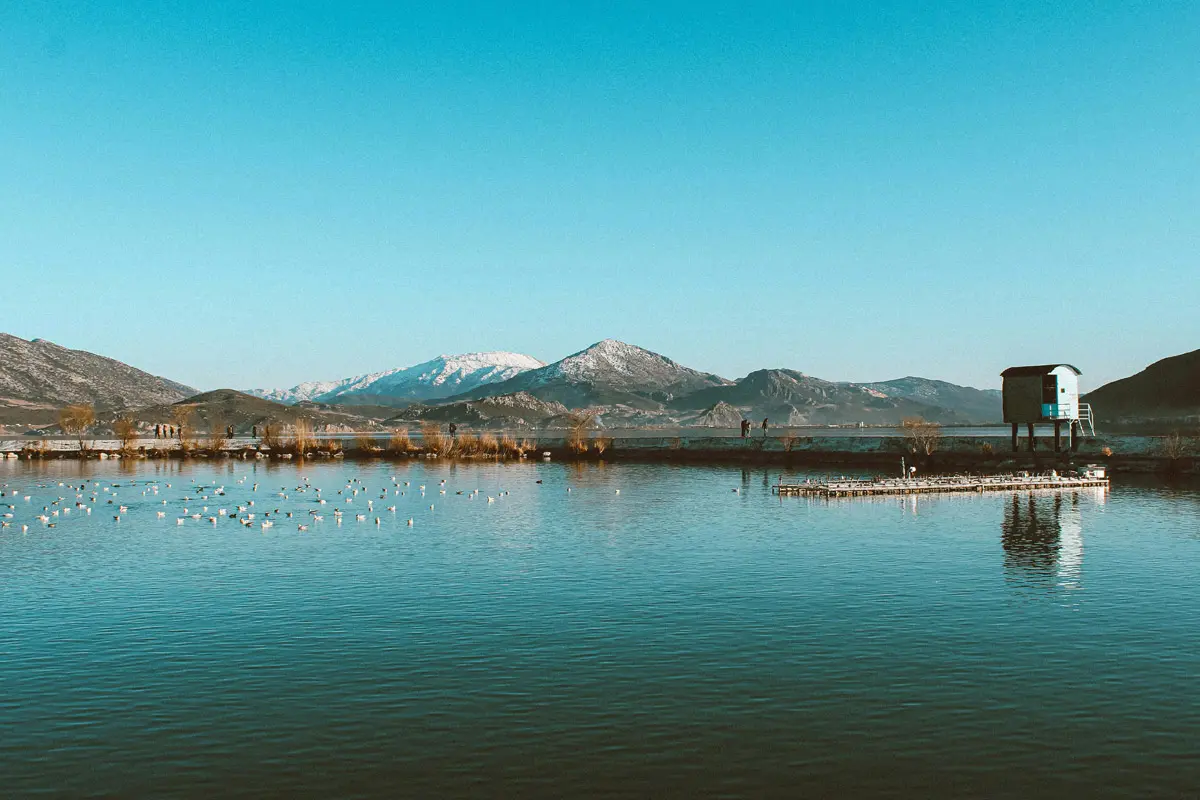The owner of the small, white-washed pension eyed me quizzically. He was a little disheveled, curly hair awry and a day’s stubble shadowing his already weather-beaten countenance. Although it was early still, he’d already done half a day’s work, fishing in the lake.
“What is there to do on the island?” He repeated my question rhetorically and ruminated on it for a while. Then, his face suddenly split into a broad smile and, as if he’d just had the most original and brilliant of ideas, he continued “Why, you could walk around it!”
Now it was my turn to look quizzical. Still, he was a local, and if he didn’t know best then who did? So off I set. Ten minutes later I was back, having circumnavigated the entire island. I’d only just arrived, and hadn’t booked in yet. I wondered, in that restless way travelers often do, whether I should head straight on to some place new. All I had to do was make my apologies, shoulder my bag and be gone — maybe east to Cappadocia — or down to Antalya and the Mediterranean.
Just then my fishermen/pension proprietor and would-be host (let’s call him Mustafa) bustled out from the kitchen and onto the terrace, bearing two steaming cups of tea. He sat down at a rickety table and motioned me to join him.
“Beautiful, isn’t it,” ventured Mustafa, idly stirring sugar into his tea “my island?”
“Oh yes, very” I replied, somewhat untruthfully. Yeşilada had yet to capture my imagination. The location was undoubtedly splendid, with the clear waters of Lake Eğirdir lapping at its edges, mountains ringing the distant shores, and the interesting looking town of Eğirdir a little under a kilometer away to the west, on the mainland.
But the island was tiny. What had I seen on my rapid circuit? A collection of rather basic whitewashed concrete houses, most of them serving as pensions or small hotels, interspersed with the dilapidated stone and timber hulks of older houses. An old barn-like building that could once have been a church. It wasn’t really even an island, with a narrow causeway connecting it to the mainland.
I looked out over the mirror like waters of the lake, some 10 meters from where I was sitting, and sipped my tea. A light breeze blew up, and dissolved its surface into a myriad of coruscating ripples. A simple wooden boat, gaily painted in bright blue, orange and white, puttered past on its way to the miniature harbor to my right. This seemed to prompt Mustafa “We could go fishing tomorrow you know, I mean, if you want.” He looked at me with penetrating but friendly brown eyes, as if wondering whether this restive foreigner was man enough for that most male of events — a fishing trip.
I don’t know whether it was the (almost certainly imagined) challenge to my masculinity, the soothing warmth of the sweet tea, the subtle play of the light on the lake or a mix of all three that encouraged me to retort “OK, that sounds like a good idea. You’re on.”
Having been on the verge of leaving after ten minutes, I ended up spending almost a week on Yeşilada. It’s that kind of a place. A leisurely start (the fishing trip was great but I had no desire to rise at 6 a.m. every day!), a hearty Turkish breakfast (olives, cheese, tomatoes, cucumber, fresh bread, piping hot omelet, home made sour cherry and apricot jams) taken on the terrace, watching the surface of the lake change from blue to turquoise and green depending on the amount of wind and cloud.
A potter around the cobbled lanes, looking at the decaying but substantial old houses, wondering about the lives of the Greek fishermen who inhabited them until the population exchanges of 1923. Passing cats sleeping atop crumbling garden walls, shaded by spreading mulberry and fig trees. An hour or two reading back at the pension, followed by a leisurely swim from the small pebble beach next to the quay.
An evening meal at the pension, watching the sky turn orange then pink as the sun sets over the Anatolian hills to the east. Again simple but delicious food — Turkish home-cooking — with meatballs (köfte) or chicken kebab (tavuk şiş) with salad and a few chips, or battered carp or zander, courtesy of Mustafa and his fishing exploits. Or perhaps the local delicacy, mean-looking but tasty crayfish. After a glass or two of white wine or beer, it’s time to get your head down, ready for another day of doing nothing very much.
Eğirdir’s summer temperatures are ideal, with the thermometer seldom rising above 32 degrees centigrade. The lake, Turkey’s fourth largest (488 square kilometers) is set on the Anatolian plateau some 900m above sea level, a 120 kilometers north of Antalya. The air is dry and crisp, the water beautifully clean, it’s plenty warm enough to swim in — and there’s none of that itchy, nasty salt to shower-off afterwards. It’s so relaxing (bar the odd convoy of cars driving around the island, horns blaring, celebrating a circumcision or wedding) that it seems hard to summon up the energy to get off the island.
If you do make it into Eğirdir, a 20-minute walk along the causeway, there’s enough to see to make it more than worthwhile. The kale (castle) area is the first point of interest, with a collection of Ottoman-era houses clustered either side of a low ridge, and the ruins of a Byzantine/Selcuk castle, complete with an ancient canon. The kale also has a few good pensions, whose raised elevation gives them superb lake vistas. The streets between here and the main town house a lively Thursday market, with villagers coming in from the surrounding district to sell their wares (mainly the yoghurt, butter and cheese produced at their yayla or mountain pastures) and fresh fruit (the area is famed for its orchards, with apples, cherries and apricots in particular grown as cash-crops). In return they take the dolmuş (minibus) home burdened with stuff hard to find in their mountain villages — plastic bowls and buckets, spades and picks, torches and bobbins of cotton, even tinkling bells for their sheep and goats.
In the 14th century the great traveler Ibn Battuta described Eğirdir as “a great and populous town with fine bazaars, by a lake with sweet waters.” Chief amongst the buildings Battuta must have seen are the Selçuk Dündar Bey Medresesi and the Hızırbey Camii, which still stand, facing each other in the town center. Both structures have ornately carved portals, but whilst the Hızırbey Camii still serves as a working mosque, the Dündar Bey has become a shopping arcade.
In some ways Eğirdir’s attraction can be summed up by what it lacks. No five-star hotels, no discos, no bars, no speedboats pulling banana boats or paragliders, no summer humidity, no mosquitoes and no “must see” sites. It has the feel (if not the appearance or the weather!) of a British seaside resort of the 1950’s — quiet, gentle and unassuming, where simple pleasures like promenading, bathing, boat trips, eating, sitting, reading and talking take precedence.
Don’t get me wrong. I am not the kind of person who generally likes to laze around. I have walked and trekked through most of Turkey’s mountain ranges, climbed to the top of dozens, skied down a few, and even helped research and way mark the St. Paul long-distance walking trail, which passes right through Eğirdir. Plus I have visited countless “hard to get to” sites throughout the country, many of them time after time.
But for me Eğirdir and Yeşilada are about switching off and relaxing. About thinking about climbing one of the impressive local peaks, but leaving it for another time. About telling Mustafa I’ll go fishing with him every day, but never quite managing to get up on time. I have visited Eğirdir many times over the years, occasionally on my own, more often with my two, now teenage, sons (who, incidentally, love its simple charms). Mustafa, and his wife, their children, his grandfather, his aunt and uncle, his cousins — and the many others who drop in and out of the pension and whose relationship to Mustafa I have yet to work out, have become friends. And if I were given a pound for every time I’d followed Mustafa’s advice to “walk around the island” I’d be a rich man today.

